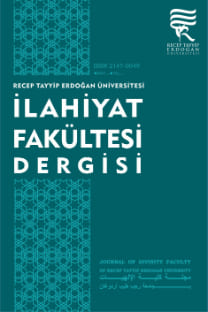KUR'AN'I ANLAMADA VAKFIN ROLÜ
Muhatabın zihnine metnin doğru bir şekilde iletilebilmesi için dillerin geliştirdiği bir takım teknikler vardır. Bu tekniklerin başında da noktalama işaretleri gelmektedir. Günümüzde hemen hemen bütün dillerde kullanılan noktalama işaretlerinin Kur’an terminolojisindeki ifadesi ise “ilmu’l-vakf ve’l-ibtidâ”dır. Doğru mananın ortaya konulması sağlıklı iletişim için olmazsa olmaz bir şarttır. Söz konusu Kur’an olunca durum daha da bir ehemmiyet arz etmektedir. Çünkü sahih bir itikadın belirlenmesi, hükümlerin doğru tespiti vakf ve ibtida sisteminin doğru işletilmesine bağlıdır. Elinizdeki söz konusu tercüme makalede de vakf konusu önemine binaen istifadeye sunulmuştur.
ROLE OF THE WAQF IN UNDERSTANDING THE QURAN
A sentence without a clear begin and end, without emphasize may result in loss of meaning and misunderstanding. There are some different techniques developed by languages in order to gain meaning in the readers mind and prevent this misunderstanding and loss of meaning. Punctuation can be stated as the first of these techniques. Punctuation as a common property of languages corresponds to “Science of Waqf and ibtidâ” in the terminology of Qur‟an. To state the he right meaning, is vital for a healthy communication. If the subject is Qur‟an then this becomes more and more important. This stems from the fact that: “Using the Waqf and ibtidâ system correctly has a high positive correlation with establishing the belief properly, and determining the rules without any mistake.” “Waqf and Ġbtida” is one of the subjects included in the education of Qur‟an from the times of prophet till the date that is why it has been a research subject in the area of theology, canon law and grammar. In this translated article the “Waqf” subject is presented due to its importance.
Keywords:
Waqf, ibtidâ, recitation, meaning,
___
- Ebû Ca‟fer en-Nehhâs, el-Kat‟ ve‟l-i‟tinâf, mhk. Ahmed Hattab el„Umer, Bağdat: Matbaatü‟l-„Ânî, 1978. Ebû Hayyan el-Endelûsî, Tefsirü‟l-bahru‟l-muhît, mhk. Adil Ahmed, Ali Muhammed, Beyrut: Daru‟l-Kütübi‟l-Ġlmiyye, 1993. Ebû‟l-Ferec Ġbnü‟l-Cevzî, Zâdü‟l-mesîr fî İlmi‟t-tefsîr, nĢr. Züheyr eĢ- ġavîĢ, Beyrut: el-Mektebü‟l-Ġslâmî, 1984, I-IX. Ebu‟l-Hilâl el-Hasen el-Askeri, Kitabü‟s-sınaateyn el-Kitabe ve‟ş-şi'r, mhk. Müfid Muhammed Kumeyha, Beyrut: Dâru'l-Kütübi‟lĠlmiyye, 1984. EĢmûnî, Ahmed b. Muhammed b. Abdulkerim Menâru‟l-hüdâ fî beyâni‟l-vakfi ve‟l-ibtidâ, Mısır (Cemâliye) 1889. Ġbn Kesir, Ebü'l-Fida Ġmadüddin Ġsmail b. Ömer, Tefsirü'l-Kur'âni'lAzim, Beyrut: Dâru'l-Ma‟rife, 1969, I-IV. Ġbnü‟l-Cezerî, en-Neşr fi‟l-kıraâti‟l-aşr, Beyrut: Dâru‟l-Kütübi‟lĠlmiyye, ts., I-II. Ġbnü‟l-Enbârî, Ebû Bekr Muhammed b. Kasım, Îzâhü‟l-vakf ve‟libtidâ, mhk. Muhyiddin Ramazan, DımeĢk 1971. Kurtûbî, el-Câmi' li-ahkâmi'l-Kur'ân, mhk. Abdullah b. Abdülmuhsin et-Türkî, Beyrut: Müessesetü‟r-Risale, 2006. Mekkî b. Ebî Talib, Müşkilü i‟râbi‟l-Kur‟an, mhk. Yasin Muhammed es-Sevvad, DimeĢk: Dâru‟l-Mü‟min, ts, I-II. Suyûtî, Celâluddîn Abdurrahman, el-İtkân fî ulûmi‟l-Kur‟ân, mhk. Muhammed Ebü'l-Fazl Ġbrâhim, Kahire: Dâru't-Turâs, 1985. Taberî, Câmi‟u‟l-beyân „an te‟vîli âyi‟l-Kur‟an, mhk. Mahmud Muhammed ġakir, Kahire: Mektebe Ġbn Teymiyye, ts. Yakût, Ahmed Süleyman, Zahiretü‟l-i‟râb fi‟l-Kur‟an, Ġskenderiye: Dâru‟l-Ma‟rife, 1994. ZekeĢî, Bedruddin Muhammed b. Abdullah, el-Burhân fî ulûmi‟lKur‟an, mhk. Muhammed Ebu‟l-Fadl Ġbrahim, Kahire: Dâru‟tTurâs, 1984, I-IV. ZemahĢerî, Ebü'l-Kâsım Cârullah Mahmûd b. Ömer, el-Keşşaf an hakâiki ğavâmizi‟t-tenzil ve uyuni‟l-ekavil fî vucühi‟t-te‟vil, mhk. Adil Ahmed Abdülmevcud, Ali Muhammed Muavviz, Riyad: Mektebetü‟l-Ubeykan, 1998/1418, I-VI.
- Yayın Aralığı: Yılda 2 Sayı
- Yayıncı: Recep Tayyip Erdoğan Üniversitesi İlahiyat Fakültesi
Sayıdaki Diğer Makaleler
BEYÂNU’L–HAK ADLI MEÂL-TEFSİR ÜZERİNE BİR ELEŞTİRİ
Ebû Dâvud’un Sünen’i (Kaynakları ve Tasnif Metodu)
OSMANLININ SON DÖNEMİNDE RİZE’DE SOSYAL HAYAT (1911-1913)
9. TÜRKİYE TEFSİR AKADEMİSYENLERİ BULUŞMASI VE KUR’AN NÜZÛLÜNÜN MEKKE DÖNEMİ SEMPOZYUMU
HİNT İNEK TAPIMININ BUGÜNKÜ DURUMU
Tadeusz MARGUL, Ali İhsan YİTİK, Aynur YILDIZ
İlâhi Dinlerde Yiyecek ve İçecekler
İsmail Ahmet ET-TAHHÂN, Necattin HANAY
KUR'ÂN'IN AHLÂKÎ- HUKÛKÎ METİNLERİNE BAĞLAMSALCI YAKLAŞIM ÜZERİNE
JOSIAH ROYCE’UN SADAKAT FELSEFESİNE GÖRE HIRİSTİYANLIK BİR SADAKAT DİNİ MİDİR?
ZİYA GÖKALP’İN İÇTİMÂİ USÛL-İ FIKIH ÖNERİSİ VE İZMİRLİ İSMAİL HAKKI’NIN KARŞI ELEŞTİRİSİ
